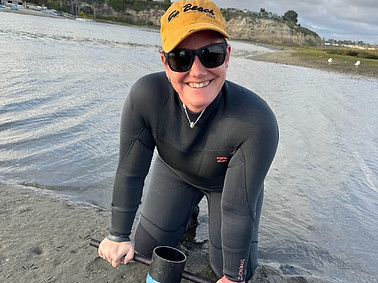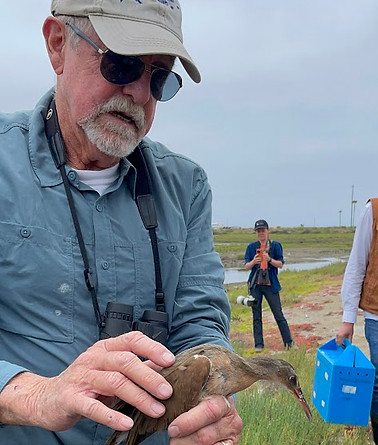

Science in the Bay
Scientists, researchers, and students from various universities, institutions, and consulting agencies come together at Upper Newport Bay to study and enhance the understanding of estuarine systems. Featured below are some of the scientists currently conducting research in the bay.
Estuary Monitoring
Jan Walker, Ph.D.
I build monitoring programs for the state of California, so we can better understand the health of our bays and estuaries. Specifically, I study how estuaries, like Newport Bay, may change through time due to changes in the environment from increased water temperatures, pollution, and urbanization. In Newport Bay, we monitor the fish and plant community to detect changes in the community. (Dr. Walker is in red beanie.)
Plastic Pollution
Clare Murphy-Hagan, Graduate Student
I study how much and at what rates plastic pollution is entering the environment. I focus on microplastics which are very small pieces of plastic that are hard to capture. In Newport Bay, I am investigating how much of these small plastics are flowing into the Back Bay, how much is getting buried in the wetland sediment, and how much is making it to the ocean. To do this, I collect samples of water and sediment as well as develop models that help us understand the bigger picture.
Human Activity Influencing Coastal Wetlands
Christine Whitcraft, Ph.D.
I am a coastal wetland ecologist and biological oceanographer. I study how human activities (such as development or climate change) affects what animals and plants live in coastal wetlands. I am also interested in how changes to the plants and animals affect how the wetland itself works (specifically in terms of food webs).
Coastal Endangered Species
Richard Zembal, M.S.
When I was in high school, I stole my big sister's boyfriend, and for 36 weekends in a row we went on adventures in the outdoors: fishing, hiking, gold panning, hunting, backpacking, diving, exploring, etc. I wanted to someday know the name of every plant and animal we encountered and to understand why some of them were always together and what they do for a living. I took every field class available at Cal State Long Beach, working under some of the most accomplished naturalists in their fields at that time; learning about plants, bugs, snakes, birds, mammals, the natural world. I’m still trying to learn things about our coastal wetlands and endangered species to help California Department of Fish and Wildlife save them. I have spent decades in coastal wetlands and help by sharing my experience and what I have learned in the field with them and others.

Eelgrass and Local Fish Communities
Corbin Blanch, Graduate Student
I am a first generation graduate student at CSULB in Christine Whitcraft’s Wetland Lab. I am originally from Peoria, Illinois but moved to Springfield, Missouri to obtain my Bachelor of Science in wildlife biology. I moved to Long Beach, California to work in this lab to get my Masters in Biology with an emphasis in marine biology. What got me into marine biology was when I was a sophomore in college, I watched a documentary about overfishing. I knew I wanted to work in science and help restore the natural world and after seeing all the issues with commercial fishing. My best piece of advice to young researchers or those still finding their way: choose a question (or problem) you wish to help with, from there build your career. Often we can be blinded by wanting to help a specific species or animals but largely we want to help with the bigger issues and the (mostly fun) work will come with it.
Ecology and Student Development
Tanya Hoerer, Ph.D.
I live in Costa Mesa, California and I am a Professor of Organismal Biology and Marine Science at Coastline Community College in Newport Beach. I earned my Ph.D. in Biological Sciences from Syracuse University, where I studied the processes that support plants and large grazers such as bison and elk in Yellowstone National Park. I teach major’s biology, introductory biology, Environmental Science, Marine Science, Human Ecology and Human Anatomy at Coastline College, and provide research opportunities for students in the fields of ecology, Marine Science, and Human Anatomy including gardening, native bee monitoring, and 3D printing prosthetics. My interests in the field of Biology are quite broad and my experience in industry includes environmental consulting locally and research for a neuroscience education institute.
Microbial Ecology
David Bañuelas, Ph.D.
I study how small organisms like fungi and bacteria help keep our natural spaces, like salt marshes and forests, healthy. My work at Upper Newport Bay looks at how these tiny helpers work with plants to protect the bay as the water and land around it change over time. I also lead community events to keep the bay healthy and to teach people about these cool science connections.





